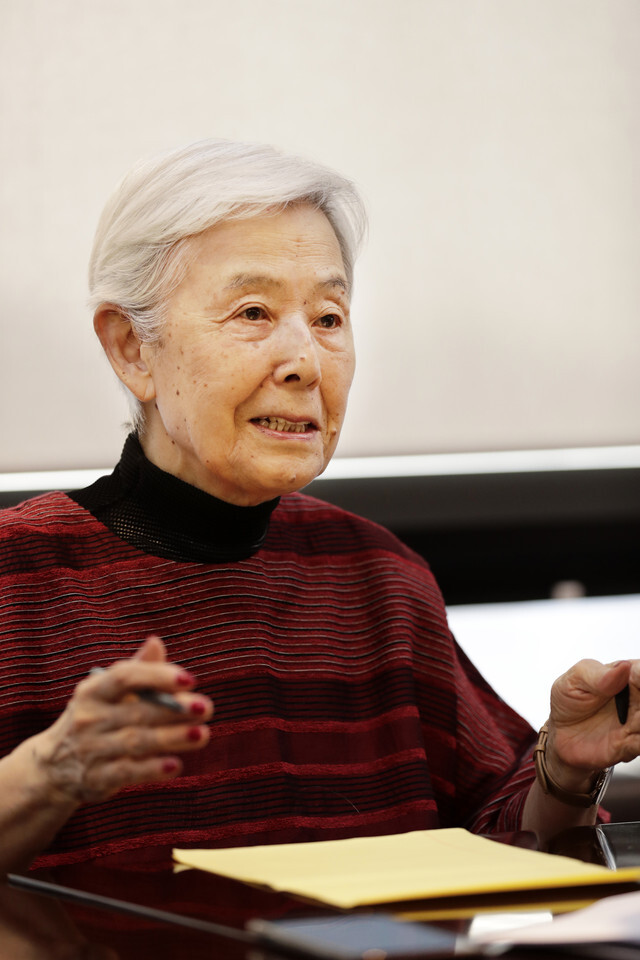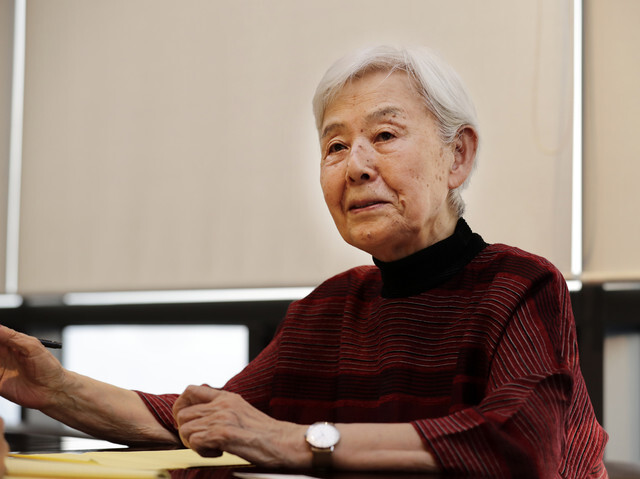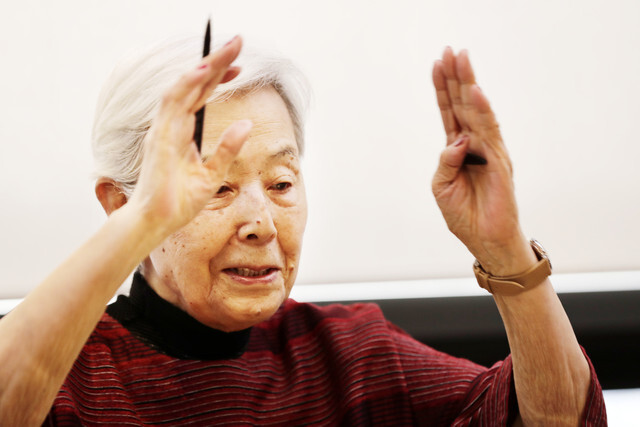hankyoreh
Links to other country sites 다른 나라 사이트 링크
[Interview] Japanese professor claims comfort women system was a “crime of the state”

“I think it’s only natural for the Koreans who were subjected under Japan’s colonial occupation to see the comfort women issue as a national issue. But it’s actually an issue of women in wartime.”
For Koreans, the issue of the women forced into sexual slavery by the Japanese military is one of the major historical symbols of the cruelty and suffering of Japan’s 36-year colonial occupation. But the point stressed by Michiko Nakahara, professor emeritus of Waseda University, is the universality of the comfort women issue, which constituted a crime against women in war.
Nakahara, co-leader of Violence Against Women in War Research Action Center, is a feminist activist who has long been a student of the comfort women issue, as well as a participant in practical efforts to tackle the issue in Japan.
Nakahara sat down with the Hankyoreh on Oct. 21 while visiting South Korea to attend a lecture on Oct. 22 commemorating the 19th anniversary of a 2000 international tribunal on war crimes committed against women. She was attending the lecture on the invitation of the Northeast Asian History Foundation.
“My original scholarly interest was Malaysia. Rallies about the comfort women issue were being held in Japan in the 1990s, and I advised a Malaysian reporter to cover the rallies. As it happened, that story ran on the front page of a local newspaper, which ignited interest in the comfort women issue in Malaysia. I got involved in the issue while helping out a victim by the name of Rosalind Saw. We got to know each other over tea and meals, and I eventually asked her to become my godmother. That was the beginning of my connection with the comfort women issue,” Nakahara said.

Inspired by Japanese journalist and feminist Yayori Matsui
Nakahara went on to participate in the “trial of the century” with a noted Japanese journalist and feminist named Yayori Matsui (1934-2002), who was working as a reporter for the Asahi Shimbun. This was the civilian trial called the Women’s International War Crimes Tribunal on Japan’s Military Sexual Slavery, which began on Dec. 8, 2000, and lasted for three days.
“Because we’d been so shocked by the comfort women issue, we were just focused on bringing it to the attention of other Japanese, but Matsui was different,” Nakahara recalled. “Matsui suddenly said the comfort women issue was a crime by the Japanese military and state against women and proposed organizing a trial [to demonstrate that]. We were really afraid about whether such a trial would even be possible, but we went ahead with it regardless. Even looking back now, Matsui was an amazing person.”
In June 1998, Nakahara and others created the Violence Against Women in War Network Japan in order to prepare for the trial. But she still had a lot to worry about. Her biggest fear was the fact that Emperor Hirohito, the supreme commander of the military and the person who bore the most responsibility for the war, would be on trial. Matsui and the people organizing the trial started to receive threats from the right wing. In the end, they had to go into hiding, concerned about what might happen to them.
Furthermore, bringing victims scattered throughout Asia together in Tokyo required great persistence, and entailed enormous expense. “A total of 64 victims were called as witnesses in the trial. Most of the women were advanced in age and needed at least two family members or activists to help them. We also had to pay airfare, living expenses, and interpretation and translation fees. Along the way, I started wondering whether I’d have to dip into my retirement savings, but an elderly woman in Japan donated a huge amount of money in the belief that we needed to atone for the crimes of the emperor,” Nakahara said.
This civilian tribunal convicted nine individuals, including Emperor Hirohito, of being responsible for the comfort women system. This was a historic ruling, a manifest declaration that the comfort woman system was a crime against humanity, just as the Nazis’ Holocaust against the Jews was.

How a Korean comfort women researcher changed Nakahara’s life
The next major turning point in Nakahara’s life was when Hong Yun-shin (author of “Comfort Stations and Memories on the Battlefields of Okinawa”), who was studying under her in the doctoral program at Waseda University, stumbled upon crucial testimony while visiting Miyako Island for a survey of Okinawa comfort stations. Hirotoshi Yonaha, a resident of the island, told Hong that he remembered a well on the island where fair-skinned Korean women had drawn water, done their laundry, and relaxed when he was 12 years old. Yonaha had always been curious about the women who’d abruptly appeared on the island only to disappear after the war and had eventually learned that they’d been comfort women. Later surveys revealed that there’d been a total of 17 comfort stations on the island of Miyako alone.
Hong ended up telling Nakahara and Yun Jeong-ok (94), a pioneering figure in Korean feminism, that Yonaha wanted to build a memorial to the former comfort women there. Nakahara organized a fundraiser that culminated in the construction of the memorial on Sept. 7, 2008. Titled “To Women,” the memorial is engraved in 12 languages, to honor all 12 nationalities of women who were victimized by the comfort women system.
Nakahara attacked the tendency — prevalent in both South Korean and Japanese society — to deny that the comfort women issue was a “crime of the state” perpetrated by the Japanese government and military.
Japanese gynecologist testifies Korean women were “tricked” into serving as comfort women
“Aso Tetsuo (1910-1989), a gynecologist who graduated from the medical school at Kyushu University, was mobilized by the army in November 1937. His questions about why a gynecologist would be drafted were answered when he reached Shanghai and found the comfort station there,” Nakahara said.
After being ordered to perform physicals on 100 women at the comfort station, Aso wrote the following account in his diary: “The comfort women from Japan had experience with prostitution, but the ones from the Korean Peninsula [were different]: some didn’t even seem to have any sexual experience at all.”
The women from the Korean Peninsula “were tricked into coming on the understanding that they’d be given good jobs,” Nakahara said. “That was fraud. Why would a woman without any sexual experience sign up to be a comfort woman?”
Nakahara also reconfirmed her principled opposition to the comfort women agreement reached by the South Korean and Japanese governments on Dec. 28, 2015. “I don’t see an agreement signed by the leaders of the two countries without the approval of the victims as being a solution; in fact, it’s not worth much of anything,” she said.
By Gil Yun-hyung, staff reporter
Please direct comments or questions to [english@hani.co.kr]

Editorial・opinion
![[Editorial] Penalties for airing allegations against Korea’s first lady endanger free press [Editorial] Penalties for airing allegations against Korea’s first lady endanger free press](https://flexible.img.hani.co.kr/flexible/normal/500/300/imgdb/original/2024/0502/1817146398095106.jpg) [Editorial] Penalties for airing allegations against Korea’s first lady endanger free press
[Editorial] Penalties for airing allegations against Korea’s first lady endanger free press![[Editorial] Yoon must halt procurement of SM-3 interceptor missiles [Editorial] Yoon must halt procurement of SM-3 interceptor missiles](https://flexible.img.hani.co.kr/flexible/normal/500/300/imgdb/child/2024/0501/17145495551605_1717145495195344.jpg) [Editorial] Yoon must halt procurement of SM-3 interceptor missiles
[Editorial] Yoon must halt procurement of SM-3 interceptor missiles- [Guest essay] Maybe Korea’s rapid population decline is an opportunity, not a crisis
- [Column] Can Yoon steer diplomacy with Russia, China back on track?
- [Column] Season 2 of special prosecutor probe may be coming to Korea soon
- [Column] Park Geun-hye déjà vu in Yoon Suk-yeol
- [Editorial] New weight of N. Korea’s nuclear threats makes dialogue all the more urgent
- [Guest essay] The real reason Korea’s new right wants to dub Rhee a founding father
- [Column] ‘Choson’: Is it time we start referring to N. Korea in its own terms?
- [Editorial] Japan’s rewriting of history with Korea has gone too far
Most viewed articles
- 1Bills for Itaewon crush inquiry, special counsel probe into Marine’s death pass National Assembly
- 2[Editorial] Penalties for airing allegations against Korea’s first lady endanger free press
- 3Months and months of overdue wages are pushing migrant workers in Korea into debt
- 4[Reporter’s notebook] In Min’s world, she’s the artist — and NewJeans is her art
- 51 in 3 S. Korean security experts support nuclear armament, CSIS finds
- 6Trump asks why US would defend Korea, hints at hiking Seoul’s defense cost burden
- 760% of young Koreans see no need to have kids after marriage
- 8S. Korea discusses participation in defense development with AUKUS alliance
- 9Korean firms cut costs, work overtime amid global economic uncertainties
- 10[Guest essay] Maybe Korea’s rapid population decline is an opportunity, not a crisis